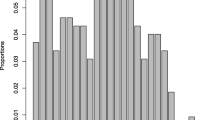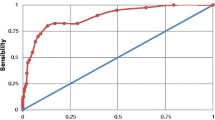Abstract
Recent reports suggest that antenatal depression is as prevalent as postnatal depression. The Edinburgh Postnatal Depression Scale (EPDS) is the most widely used tool to detect postnatal depression, which can also detect depression during the antenatal period. Mothers of Pakistani origin have the highest birth rate in the UK. The validity of EPDS has not been assessed in this group. A prospective cohort of 714 women in their third trimester of pregnancy completed the EPDS while waiting for their antenatal visit. Women scoring 12 or more on the EPDS, and a random sample of low scores were assessed with the Schedule for Clinical Assessment in Neuropsychiatry to establish psychiatric diagnosis. A cut-off point of 8 showed the best discrimination with sensitivity = 89.6 % and specificity 54.7 %. Positive predictive value was 29.4 and negative predictive value was 96.2. The area under the curve (AUC) was 0.72 (0.66–0.78). When language is taken into account the area under the ROC curve for subjects who preferred the Urdu or Punjabi language is slightly higher at 0.79 than those who preferred English (0.61). We have not been able to find a single clear cut-off is a result of the AUCs not being particularly large, and confirms that the EPDS should only be used as a screen and not for diagnostic purposes. The larger AUC for the Urdu/Punjabi speakers than for the English speakers suggests that the EPDS is as good a screen for this group as for the indigenous English population.


Similar content being viewed by others
References
Weissman M, Olfson M. Depression in women: implications for health care research. Science. 1995;269:799–801.
WHO. Depression. http://www.who.int/mental_health/management/depression/definition/en/ (2003).
Evans J, Heron J, Francomb H, Oke S, Golding J. Cohort study of depressed mood during pregnancy and after childbirth. BMJ. 2001;323:257–60.
Rahman A, Iqbal Z, Harrington R. Life events, social support and depression in childbirth: perspectives from a rural community in the developing world. Psychol Med. 2003;33:1161–7.
Beck CT. Predictors of postpartum depression: an update. Nurs Res. 2001;50:275–85.
Gavin NI, Gaynes BN, Lohr KN, Meltzer-Brody S, Gartlehner G, Swinson T. Perinatal depression: a systematic review of prevalence and incidence. Obstet Gynecol. 2005;106:1071–83.
Rich-Edwards JW, Kleinman K, Abrams A, Harlow BL, McLaughlin TJ, Joffe H, Gillman MW. Sociodemographic predictors of antenatal and postpartum depressive symptoms among women in a medical group practice. J Epidemiol Community Health. 2006;60:221–7.
Robertson E, Grace S, Wallington T, Stewart DE. Antenatal risk factors for postpartum depression: a synthesis of recent literature. Gen Hosp Psychiatry. 2004;26:289–95.
Cooper PJ, Murray L. Fortnightly review: postnatal depression. BMJ. 1998;316:1884–6.
Patel V, DeSouza N, Rodrigues M. Postnatal depression and infant growth and development in low income countries: a cohort study from Goa, India. Arch Dis Child. 2003;88:34–7.
Rahman A, Iqbal Z, Bunn J, Lovel H, Harrington R. Impact of maternal depression on infant nutritional status and illness: a cohort study. Arch Gen Psychiatry. 2004;61:946–52.
Barker DJP. The foetal origins of adult disease. Biol Sci. 1995;262:37–43.
Dennis C-L. Can we identify mothers at risk for postpartum depression in the immediate postpartum period using the Edinburgh PostNatal Depression Scale? J Affect Disord. 2002;78(2):163–9.
Census. National census figures. Office of the National Statistics (ONS). www.statistics.gov.uk (2009).
Rahman A, Iqbal Z, Lovel H, Shah M. Screening for postnatal depression in the developing world: a comparison of the WHO self-reporting questionnaire (SRQ-20) and the Edinburgh Postnatal Depression Scale (EPDS). J Pak Psychiatr Soc. 2005;2:69.
Husain N, Cruickshank K, Husain M, Khan S, Tomenson B, Rahman A. Social stress and depression during pregnancy and in the postnatal period in British Pakistani mothers: a cohort study. J Affect Disord. 2012;140(3):268–76.
Cox JL, Holden JM, Sagovsky R. Detection of postnatal depression. Development of the 10-item Edinburgh Postnatal Depression Scale. Br J Psychiatry. 1987;150:782–6.
WHO. SCAN: Schedule for Clinical Assessment in Neuropsychiatry. World Health Organization Geneva. Switzerland (1994).
Cox JL, Holden JM. Perinatal psychiatry. London: GASKELL; 1994.
Husain N, Bevc I, Husain M, Chaudhry IB, Atif N, Rahman A. Prevalence and social correlates of postnatal depression in a low income country. Arch Women’s Mental Health. 2006;9:197–202.
Gater R, Tomenson B, Percival C, Chaudhry N, Waheed W, Dunn G, et al. Persistent depressive disorders and social stress in people of Pakistani origin and white Europeans in UK. Soc Psychiatry Psychiatr Epidemiol. 2009;44:198–207.
Dunn G. Statistics in psychiatry. London: Arnold; 2000.
National Institute for Health and Clinical Excellence. Antenatal and postnatal mental health: CLINICAL Management and Service Guidelines, NICE Guidelines 45. National Collaborating Centre for Mental Health. London (2007).
Patel V, Rodrigues M, DeSouza N. Gender, poverty, and postnatal depression: a study of mothers in Goa, India. Am J Psychiatry. 2002;159:43–7.
Bennett HA, Einarson A, Taddio A, Koren G, Einarson TR. Prevalence of depression during pregnancy: systematic review. Obstet Gynecol. 2004;103:698–709.
Gaynes BN, Gavin N, Meltzer-Brody S, Lohr KN, Swinson T, Gartlehner G, Brody S, Miller WC. Perinatal depression: prevalence, screening accuracy, and screening outcomes. Evid Rep Technol Assess (Summ). 2005;119:1–8.
Werrett J, Clifford C. Validation of the Punjabi version of the Edinburgh postnatal depression scale (EPDS). Int J Nurs Stud. 2006;43:227–36.
Adewuya AO, Ola BA, Dada AO, Fasoto OO. Validation of the Edinburgh Postnatal Depression Scale as a screening tool for depression in late pregnancy among Nigerian women. J Psychosom Obstet Gynecol. 2006;27:267–72.
Adouard F, Glangeaud-Freudenthal NMC, Golse B. Validation of the Edinburgh postnatal depression scale (EPDS) in a sample of women with high-risk pregnancies in France. Arch Women’s Mental Health. 2005;8:89–95.
Garcia-Esteve L, Ascaso C, Ojuel J, Navarro P. Validation of the Edinburgh Postnatal Depression Scale (EPDS) in Spanish mothers. J Affect Disord. 2003;75:71–6.
Pollock JI, Manaseki-Holland S, Patel V. Detection of depression in women of child-bearing age in non-western cultures: a comparison of the Edinburgh Postnatal Depression Scale and the Self-Reporting Questionnaire-20 in Mongolia. J Affect Disord. 2006;92:267–71.
O’Hara MW, Swain AM. Rates and risk of postpartum depression—a meta analysis. Int Rev Psychiatry. 1996;8:1, 37–54.
Cox JL, Holden JM. Perinatal mental health: a guide to the Edinburgh Postnatal Depression Scale (EPDS). London: The Royal College of Psychiatrists, Gaskell (2003).
Littlewood R. From categories to contexts: a decade of the ‘new cross-cultural psychiatry’. Br J Psychiatry. 1990;156:308–27.
Canino G, Lewis Fernandez R, Bravo M. Methodological challenges in cross-cultural mental health research. Transcult Psychiatry. 1997;34:163–84.
Halbreich U, Karkun S. Cross-cultural and social diversity o prevalence of pospartum depression and depressive symptoms. J Affect Disord. 2006;91(2):97–111.
Collette C, Asha D, John C, Julie W. A cross-cultural analysis of the use of the Edinburgh Post-Natal Depression Scale (EPDS) in health visiting practice. J Adv Nurs. 1999;30:655–64.
Zimet GD, Dahlem NW, Zimet SG, Farley GK. The multidimensional scale of perceived social support. J Pers Assess. 1988;52:30–41.
Acknowledgments
The study was funded by the MRC Brain Sciences Initiative—Pathfinder grant (grant ref: G0401084). We will like to thank all the participants who took part in the study. We would also like to extend our thanks to Dr Fiona Clark and Ms Helen Dyson (East Lancashire Hospitals), Fiona Pritchard and Aysha Khan (MRI) and Mrs Salma Ahmed, Dr Saeeda Bano (the research team).
Conflict of interest
I affirm none of the authors are involved with any financial organization or have any other conflict of interest which would impact upon the result of the publication.
Author information
Authors and Affiliations
Corresponding author
Rights and permissions
About this article
Cite this article
Husain, N., Rahman, A., Husain, M. et al. Detecting Depression in Pregnancy: Validation of EPDS in British Pakistani Mothers. J Immigrant Minority Health 16, 1085–1092 (2014). https://doi.org/10.1007/s10903-014-9981-2
Published:
Issue Date:
DOI: https://doi.org/10.1007/s10903-014-9981-2




